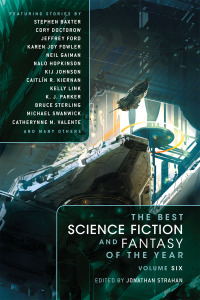Infinity Wars by Jonathan Strahan (ed.)
 Friday, January 26, 2018 at 8:59AM
Friday, January 26, 2018 at 8:59AM 
Published by Solaris on September 12, 2017
Infinity Wars collects a number of original science fiction stories about war, some of which are surprisingly good. The approaches are generally different from typical military science fiction.
The protagonist of Caroline M. Yoachim’s “Faceless Soldiers, Patchwork Ship” is sent on a mission to defeat a Borg-like enemy that uses a virus to assimilate parts of other races into a single organism. To do that, alien parts must be engrafted to her body so she appears to have already been assimilated. The story is made more interesting by a moral dilemma that the narrator must confront as she comes to understand the consequences of her mission.
Nancy Kress always has interesting ideas. In “Dear Sarah,” she imagines a young woman joining the Army to fight against the anti-alien terrorists who resent the loss of jobs that followed trade with the aliens who made clean energy available (at a price) to Earth. Her family condemns her as a traitor. I think the point of the story is that a percentage of Americans will always want to blame aliens for their problems, whether the aliens are terrestrial or ET, instead of blaming themselves for their own failures. A Waco situation develops and another point of the story might be that military solutions are never good solutions to a standoff. The story works because the protagonist needs to make a tough moral choice, and internal conflicts are at the heart of strong fiction.
“Oracle” by Dominica Phetteplace is an amusing story about a woman who uses software to manage the Pentagon’s “war-of-the-month club,” its success measured by the president’s approval ratings — until the war AI begins to think for itself. Also amusing is Garth Nix’s “Conversations with an Armory,” in which a group of disabled soldiers from the last war are trying to fight the new one, but can’t convince a sentient and rather bossy armory to open its doors.
“Weather Girl” by E.J. Swift is one of the most creative and powerful stories in the volume. It imagines weather as a weapon, not by controlling weather but by suppressing satellite and other information so that countries facing devastating storms receive no warning. The story gets its power from the personal cost that the weather war has on the woman who directs it. “Perfect Gun” by Elizabeth Bear tells the powerful story of a mercenary who doesn’t have a conscience and his relationship with a weapon that does.
A planet colonized by each of Earth’s two remaining warring factions is in a low-key conflict. Eleanor Arnason’s “Mines” imagines what it is like to live there, as told from the standpoint of an ex-soldier who has two jobs: searching for land minds with her giant poached rat, and spotting soldiers who are unfit (also with the help of her giant poached rat). This is another powerful story, providing a very personal view of how war messes people up — and how others might choose not to notice.
In Rich Larson’s “Heavies,” a soldier sent to a peaceful colony to look for signs of insurrection is startled when colonists suddenly engage in the mass murder of people from Earth. The fault, of course, rests with meddlesome Earth.
Less successful entries include David D. Levine’s “Command and Control,” a fairly ordinary battle story that uses teleportation technology as the key sf device, although the story is notable for featuring Tibetan characters in a war for liberation against the Chinese. In “The Last Broadcasts” by An Owomoyela, a woman named Daja who has ill-defined special abilities is hired to cover up the fact that a distant human colony has come under attack (and will soon be wiped out) by aliens. The story focuses on her moral dilemma, although not very deeply. I liked the setting and the premise more than the story itself. “The Evening of Their Span of Days” by Carrie Vaughn reads the like first chapter of a book told from the perspective of the person in charge of repairing docked ships at a space station. A war is coming and the station needs to gear up for it. If this were, in fact, the first chapter of a book, I would happily read the next chapter because the story and the main character are interesting. The fact that the story ends without a resolution, however, is disappointing.
Stories that didn’t work for me at all: “The Moon Is Not a Battlefield” by Indrapramit Das is a wordy conversation or interview involving Indian soldiers tasked with defending their patch of the moon. “Overburden” by Genevieve Valentine is about an incompetent colonel seeking a promotion. Peter Watts’ “ZeroS” is a fairly typical zombie soldier story.
RECOMMENDED
